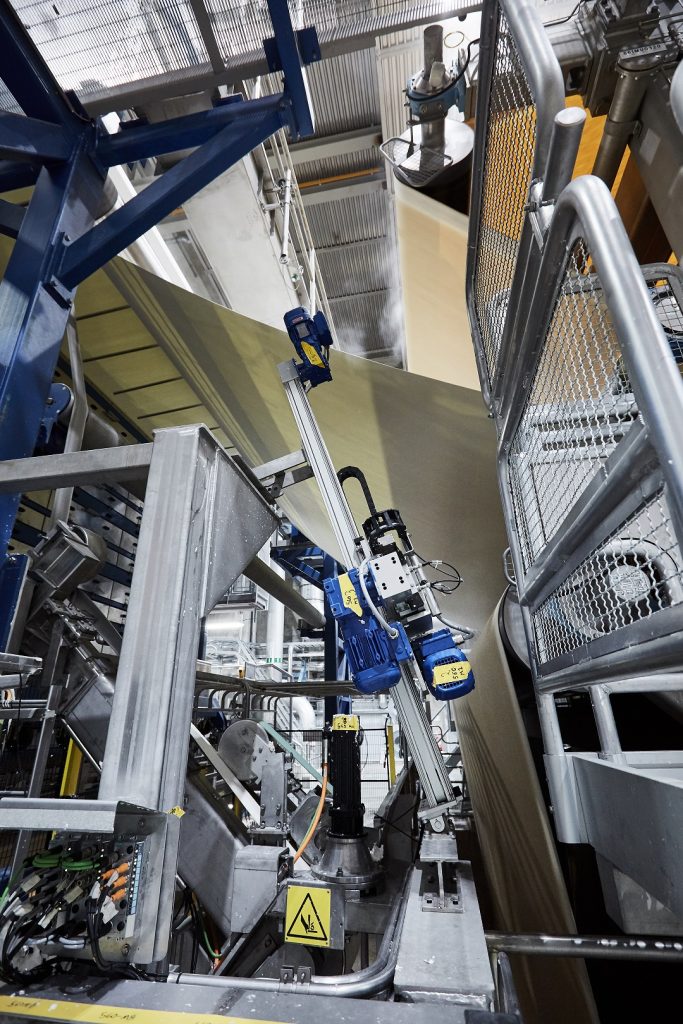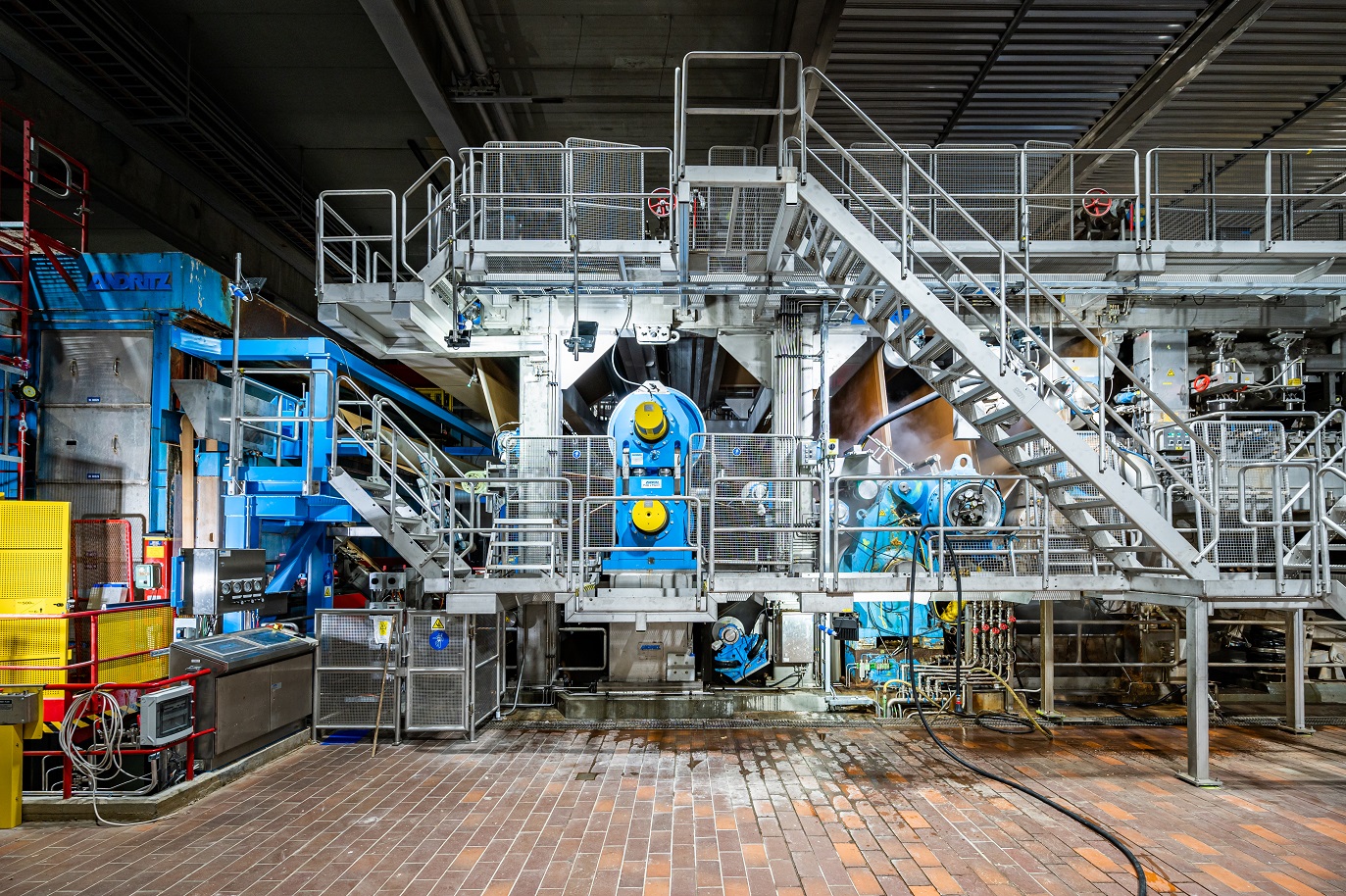Automatic Tail Threading: KEEPING SKILLED PERSONNEL SAFE
By Fredrik Fors, Product Manager, Pulp Drying, ANDRITZ
It is a credit to the skills of pulp makers across the globe that there are not more accidents reported when carrying out tail threading in the drying process. ANDRITZ has created a full range of solutions for automated tail threading from the wet end to the cutter to avoid exposure to moving parts.
“We have already been supplying ANDRITZ automatic tail threading for dryers and cutters for decades,” said Fredrik Fors, Product Manager, Dryer, Pulp Drying, ANDRITZ. “This means that we have built up a lot of experience in design and operation – we can even guarantee the success rate of the systems.”
To an outside observer, tail threading could look like a particularly dangerous task especially in the wet end due to the threading of a tail between press nips, over rolls, and other moving parts. “The majority of all tail threading at the wet end is still done by hand,” said Michael Bloder, Product and Technology Manager, Wet End, Pulp Drying, ANDRITZ. “This is a very skilled task; the operator takes the tail and feeds it between presses and rolls.
“But this is also a dangerous task; just a slip or a trip could mean a fatality or at the least a serious injury. As the focus on safety has increased, ANDRITZ has already been hard at work on developing automatic tail threading for the wet end, which means the system now covers the whole line.”
“After a lot of development work, we now have automatic tail threading applicable to machines and equipment of any design and production processes and at a wide range of speeds. These can all be combined with center tails as well as edge tails,” added Fors.
Moreover, pulp producers are aiming to increase the safety of their employees. Personnel shall no longer be exposed to running equipment and machines that, of course, directly affect tail threading procedures.
TAILOR-MADE FOR EACH APPLICATION
The automatic tail threaders have different designs for different stations along the line, and all are tailored individually to the particular stations. The automatic threading technology includes various solutions to ensure that tail threading takes place accurately, for example, threading tape, conveyors, a mixture of vacuums, and cushions of air.
“There are different principals needed at each threading area according to where the sheet is on the line,” said Bloder. “The wet end, for instance, demands a different format of threader sequence and technology as the sheet is much weaker, and it carries a lot more water.”
Wet end automatic threaders are not as common in the industry, simply because demand and regulation have not yet existed for the wet end. However new regulations set to be introduced into the industry means that pulp producers will need to install automatic threaders onto the wet end in the near future. “There are relatively few installations of the tail feeders in the wet end area globally,” said Bloder, “however, we are expecting a ramp up of installations as the regulations come in.”
“We now have cases where pulp producing companies are not even getting permits to operate new lines without automatic tail threaders on board.
All our systems have now been developed to be hands-free, which means safe feeding throughout the whole machine,” said Fors.
COMPLYING WITH THE LATEST SAFTEY REGULATIONS
ANDRITZ now supplies automatic transfer systems for the complete pulping line that completely eliminate operational risks, providing the process with reliability and safety. Importantly, the systems also comply with all the latest safety regulations.
Added to the basic wet end transfer systems, ANDRITZ has also developed the Advanced Web Transfer for tail threading that dramatically reduces the risk of sheet breaks due to the removal of the open draw between the combi press and shoe press. In this case, the system is fully supported throughout the press section, thus leading to increased reliability.
Installations of the systems generally take just a few days, with the systems being adaptable and robust, and able to be tailored to be installed into tight spaces. “Installation is quite straightforward,” said Bloder. “We can basically find a unique solution for every customer as we are well aware that there is lot of variation when it comes to size and area available.
“Once running, the automatic tail feeders can be adjusted and optimized according to the process needs by simply touching a screen or pressing the start and stop button.”
AUTOMATIC TAIL THREADING SYSTEM REFERENCES
CENIBRA, BELO ORIENTE, MINAS GERAIS, BRAZIL
ANDRITZ recently supplied an automatic tail threading system to CENIBRA’s Belo Oriente pulp mill in Brazil. The system, from dryer to cutter, was installed on the tending side of an existing Lamb cutter that was first installed in the 1970s. There were no major modifications needed during installation.
Weldon de Paula Nascimento, Cenibra’s baling coordinator, said, “The work required to return the machine to operating status naturally demands greater attention from the operator as there are numerous actions to be carried out very close to the equipment. The system provides an increase in operator safety and has become more autonomous.”
STORA ENSO OULU, FINLAND
In 2021, ANDRITZ supplied an automatic tail threading system for the wet end and drying area to Stora Enso’s Oulu pulp mill in Finland.
Pekka Kylliäinen, Drying Machine Area Manager, OCO-project said, “Safety of our personnel is a top priority at Stora Enso. The automatic tail threading system fulfills our needs perfectly by eliminating risk of injuries during tail threading. We are satisfied with the easy operation of the system.”
SUZANO, JACAREI, SAO PAULO, BRAZIL
ANDRITZ recently supplied an automatic tail threading system throughout the forming machine and the cutter to Suzano’s Jacarei pulp mill in Brazil.
Tertuliano Rodrigues de Lima Neto, Production Manager from Suzano said, “The system has provided more security in tail threading activity as everything is now carried out automatically. The operator simply requests the process on the machine and the equipment promptly initiates the action in a continuous and safe way.“
Fabio Antero Afonso, Project Coordinator from Suzano added, “The additional benefit is that the tail threading process is now more reliable in terms of process quality and standardization.”
SCA ÖSTRAND, SWEDEN
In 2018, ANDRITZ supplied a complete new pulp drying line to SCA’s Östrand’s pulp mill in Sweden. The delivery included an automatic tail threading system that operates throughout the whole pulp drying line.
Andreas Jonsson, operation specialist from SCA Östrand said, “We are really pleased with the installation of the automatic tail threading system from ANDRITZ. The system is effective and reliable and, above all, improves safety for our operators.”




